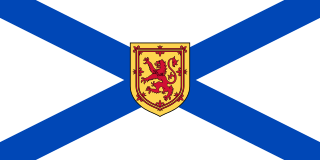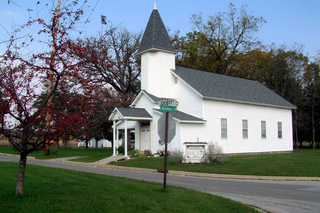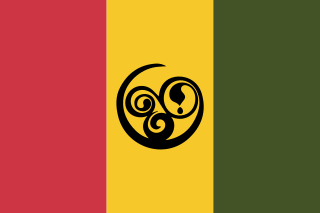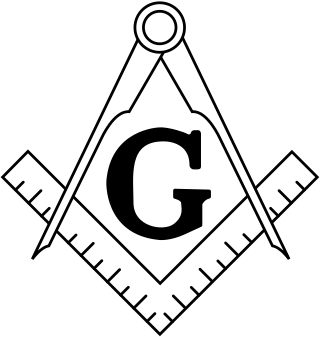
The Maritimes, also called the Maritime provinces, is a region of Eastern Canada consisting of three provinces: New Brunswick, Nova Scotia, and Prince Edward Island. The Maritimes had a population of 1,899,324 in 2021, which makes up 5.1% of Canada's population. Together with Canada's easternmost province, Newfoundland and Labrador, the Maritime provinces make up the region of Atlantic Canada.

Nova Scotia is a province of Canada, located on its east coast. It is one of the three Maritime provinces.
The Acadia Divinity College (ADC) is Baptist theological institute located in Wolfville, Nova Scotia, Canada. It is affiliated with the Canadian Baptists of Atlantic Canada. It is governed by a board of trustees with members appointed by the Convention and the Board of Governors of Acadia University. The college is also the Faculty of Theology of Acadia University.

British North America comprised the colonial territories of the British Empire in North America from 1783 onwards. English colonisation of North America began in the 16th century in Newfoundland, then further south at Roanoke and Jamestown, Virginia, and more substantially with the founding of the Thirteen Colonies along the Atlantic coast of North America.
Canadian Baptist Ministries (CBM) or Ministères Baptistes Canadiens is an association of Baptist Christian churches in Canada. It is a member of the Baptist World Alliance. The headquarter is in Mississauga, Ontario.
The Canadian Baptists of Atlantic Canada (CBAC), formerly known as Convention of Atlantic Baptist Churches (CABC) is an association of Baptist Christian churches in the eastern provinces of Canada. The offices of the CBAC are located in Moncton, New Brunswick. The union is one of four components of Canadian Baptist Ministries.

United Baptist is name of several diverse Baptist groups of Christianity in the United States and Canada.

Events from the year 1873 in Canada.

Events from the year 1890 in Canada.

The Presbyterian Church in Canada is a Presbyterian denomination, serving in Canada under this name since 1875. The United Church of Canada claimed the right to the name from 1925 to 1939. According to the Canada 2021 Census 301,400 Canadians identify themselves as Presbyterian, that is, 0.8 percent of the population.

Maritime Union is a proposed political union of the three Maritime provinces of Canada – New Brunswick, Nova Scotia, and Prince Edward Island – to form a single new province.
The European and North American Railway (E&NA) is the name for three historic Canadian and American railways which were built in New Brunswick and Maine.

The Atlantic Northeast is a geographic and cultural region of eastern North America bounded by the Atlantic Ocean to the east and (loosely) by the Saint Lawrence River to the northwest. Though no official boundary exists, the most common conception includes the Maritime provinces, southern Quebec, and the island of Newfoundland in Canada, and the New England region of the United States. Broader conceptions reach further north into Canada, including Labrador and the Côte-Nord region of Quebec. Narrower conceptions may be limited to the coastal areas east of the Appalachian Mountains. The variety of definitions can be attributed to overlapping commonalities of the region's history, culture, geography, ecology, society, and other factors.
According to the Canada 2021 Census, the number of people in Canada who identify themselves as Baptists is 436,940, about 1.2% of the population. The major Baptist associations are the Canadian Baptist Ministries, the Fellowship of Evangelical Baptist Churches in Canada, the Canadian National Baptist Convention, and the Baptist General Conference of Canada.

The history of Nova Scotia covers a period from thousands of years ago to the present day. Prior to European colonization, the lands encompassing present-day Nova Scotia were inhabited by the Mi'kmaq people. During the first 150 years of European settlement, the region was claimed by France and a colony formed, primarily made up of Catholic Acadians and Mi'kmaq. This time period involved six wars in which the Mi'kmaq along with the French and some Acadians resisted British control of the region: the French and Indian Wars, Father Rale's War and Father Le Loutre's War. During Father Le Loutre's War, the capital was moved from Annapolis Royal, Nova Scotia, to the newly established Halifax, Nova Scotia (1749). The warfare ended with the Burying the Hatchet ceremony (1761). After the colonial wars, New England Planters and Foreign Protestants immigrated to Nova Scotia. After the American Revolution, Loyalists immigrated to the colony. During the nineteenth century, Nova Scotia became self-governing in 1848 and joined the Canadian Confederation in 1867.

Black Nova Scotians are Black Canadians whose ancestors primarily date back to the Colonial United States as slaves or freemen, later arriving in Nova Scotia, Canada, during the 18th and early 19th centuries. As of the 2021 Census of Canada, 28,220 Black people live in Nova Scotia, most in Halifax. Since the 1950s, numerous Black Nova Scotians have migrated to Toronto for its larger range of opportunities. The first recorded free African person in Nova Scotia, Mathieu da Costa, a Mikmaq interpreter, was recorded among the founders of Port Royal in 1604. West Africans escaped slavery by coming to Nova Scotia in early British and French Colonies in the 17th and 18th centuries. Many came as enslaved people, primarily from the French West Indies to Nova Scotia during the founding of Louisbourg. The second major migration of people to Nova Scotia happened following the American Revolution, when the British evacuated thousands of slaves who had fled to their lines during the war. They were given freedom by the Crown if they joined British lines, and some 3,000 African Americans were resettled in Nova Scotia after the war, where they were known as Black Loyalists. There was also the forced migration of the Jamaican Maroons in 1796, although the British supported the desire of a third of the Loyalists and nearly all of the Maroons to establish Freetown in Sierra Leone four years later, where they formed the Sierra Leone Creole ethnic identity.

David George was an African-American Baptist preacher and a Black Loyalist from the American South who escaped to British lines in Savannah, Georgia; later he accepted transport to Nova Scotia and land there. He eventually resettled in Freetown, Sierra Leone where he would eventually die. With other enslaved people, George founded the Silver Bluff Baptist Church in South Carolina in 1775, the first black congregation in the present-day United States. He was later affiliated with the First African Baptist Church of Savannah, Georgia. After migration, he founded Baptist congregations in Nova Scotia and Freetown, Sierra Leone. George wrote an account of his life, an important early slave narratives.

Joseph Crandall was a Baptist minister, travelling evangelist, and for a short time a political figure in New Brunswick. Joseph Crandall is considered to be "New Brunswick's only Baptist 'Patriarch.'" He represented Westmorland County in the Legislative Assembly from 1820 to 1822.

Freemasonry is a fraternal organisation that arose from the loose organization of medieval masons working in the medieval building industry.












